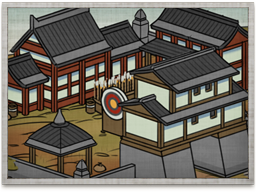Difference between revisions of "Master Bowmaker (TWS2)"
(Created page with " {{TWS2 Building|image=Image:Master Bowmaker S2TW.png |Chain=Craftwork Type |Requires='''Buildings''':<li>[[Fletchers (TWS2)|Fle...") |
m (→Description) |
||
| Line 8: | Line 8: | ||
==Description== | ==Description== | ||
| − | + | '''The master's spirit guides every arrow.''' | |
| − | + | By investing in the artisans of this province it is possible to help the economy grow through paper production and other craft industries or, by specialising in fletchers, you can improve the accuracy of the clan's bow-armed units. Craftsmen of all kinds are vital to a province, and add to the quality of life for all the people. Even the simplest peasant can appreciate good workmanship when he sees and uses something. | |
| − | + | Craftsmanship has always been admired in Japan, and no matter how it is expressed: from the calligrapher who produces the perfect brush stroke, to the potter who makes a perfect bowl. What is required from all of these men and women is absolute dedication to their craft and, eventually, the ability to make the remarkably difficult seem easy. | |
| − | + | Today the Japanese government recognises great craftsmen as ningen kokuho "living national treasures" or, more properly, juyo mukei bunkazai hojisha which translates as "preservers of important intangible cultural properties". Behind the formalised bureaucratic language is a simple and worthy idea: to preserve what is best among these highly skilled men and women. | |
[[Category:TWS2 Building]] | [[Category:TWS2 Building]] | ||
Revision as of 15:09, 4 November 2012
| Master Bowmaker (TWS2) | |
|---|---|
 | |
| Chain | Craftwork Type |
| Requires | Buildings: |
| Enables | - |
| Spawned Defence Forces | - |
| Basic Building Statistics | |
| Clan Effects | - |
| See main article; FotS Buildings | |
Description
The master's spirit guides every arrow.
By investing in the artisans of this province it is possible to help the economy grow through paper production and other craft industries or, by specialising in fletchers, you can improve the accuracy of the clan's bow-armed units. Craftsmen of all kinds are vital to a province, and add to the quality of life for all the people. Even the simplest peasant can appreciate good workmanship when he sees and uses something.
Craftsmanship has always been admired in Japan, and no matter how it is expressed: from the calligrapher who produces the perfect brush stroke, to the potter who makes a perfect bowl. What is required from all of these men and women is absolute dedication to their craft and, eventually, the ability to make the remarkably difficult seem easy.
Today the Japanese government recognises great craftsmen as ningen kokuho "living national treasures" or, more properly, juyo mukei bunkazai hojisha which translates as "preservers of important intangible cultural properties". Behind the formalised bureaucratic language is a simple and worthy idea: to preserve what is best among these highly skilled men and women.